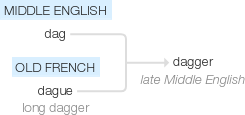Dagger
late Middle English: perhaps from obsolete dag ‘pierce, stab’, influenced by Old French dague ‘long dagger’.
wiktionary
From Middle English daggere, probably adapted from Old French dague (1229), related to Occitan, Italian, Spanish daga, Dutch dagge, German Degen, Middle Low German dagge(“knife's point”), Old Norse daggardr, Welsh dager, dagr, Breton dac, Albanian thikë(“a knife, dagger”), thek(“to stab, to pierce with a sharp object”).
In English attested from the 1380s. The ultimate origin of the word is unclear. Grimm [1] suspects Celtic origin. Others have suggested derivation from an unattested Vulgar Latin *daca "Dacian [knife]", from the Latin adjective dācus [2]. Chastelain (Dictionaire etymologique, 1750) thought that French dague was a derivation from German dagge, dagen, although not attested until a much later date).
The knightly dagger evolves from the 12th century. Guillaume le Breton (died 1226) uses daca in his Philippide. Other Middle Latin forms include daga, dagga, dagha, dagger, daggerius, daggerium, dagarium, dagarius, diga [3]; the forms with -r- are late 14th century adoptions of the English word). OED points out that there is also an English verb dag(“to stab”) from which this could be a derivation, but the verb is attested only from about 1400.
Relation to Old Armenian դակու(daku, “adze, axe”) has also been suggested [4]. Alternatively, a connection from Proto-Indo-European *dʰāg-u- and cognate with Ancient Greek θήγω(thḗgō, “to sharpen, whet”).
Perhaps from diagonal.
etymonline
dagger (n.)
"edged or pointed weapon for thrusting, shorter than a sword," late 14c. (mid-14c. in Anglo-Latin), apparently related to Old French dague "dagger," from Old Provençal or Italian daga, which are of uncertain origin; perhaps from Celtic, perhaps from Vulgar Latin *daca "Dacian knife," from the Roman province (see Dacian). The ending is possibly the faintly pejorative -ard suffix.
Attested earlier (1279) as a surname (Dagard, presumably "one who carried a dagger"). Also compare dogwood. Middle Dutch dagge, Danish daggert, German Degen also are from French. By 16c.-17c. swordsmen held it in the left hand to parry thrusts from the opponent's rapier. As "a reference mark in the form of a dagger," by 1706.
